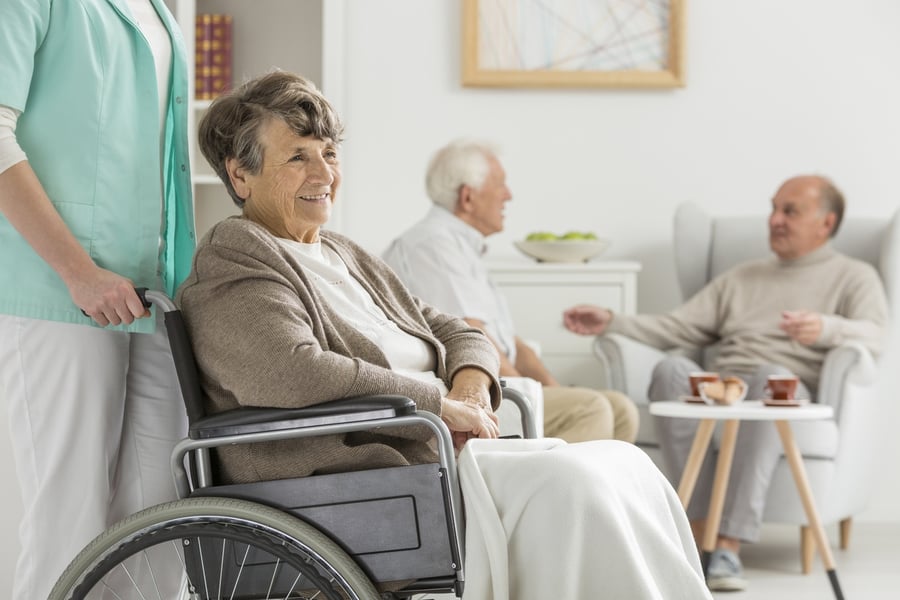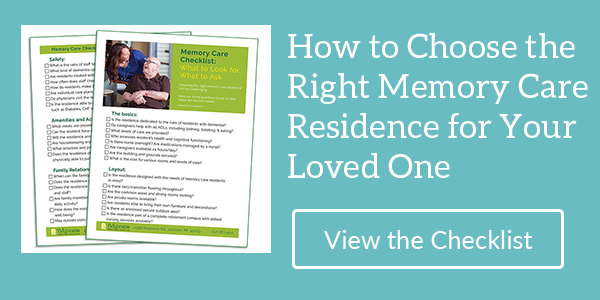
When a loved one is diagnosed with dementia, it might seem at first that the family can rally the troops and take care of them at home. But as symptoms progress, the burden of care becomes heavier and begins to take a toll on caregivers and the person with dementia. Even when the loved one is adored and respected, the reality is that the most dedicated and well-intentioned family caregivers cannot provide the level of care given by trained professional memory care staff. As a result, the person with dementia may actually be missing out on activities, protections and treatments that improve outcomes.
Although it is a very difficult decision to make, sometimes making the move to a memory care facility sooner rather than later can have a very positive impact on the person’s quality of life.
Six things memory care facilities can provide dementia sufferers at all stages:
1) Highly trained staff. Memory care is not just assisted living, it is highly specialized care addressing the specific needs of people with memory problems including dementia, Alzheimer’ disease and similar conditions. Staff in memory care facilities are trained and/or certified to provide the type of care dementia patients need to attain their highest level of functionality. From the way they speak to their patients to their understanding of the many medical, social and psychological factors involved, memory care professionals know how to manage the symptoms and behaviors that make home care so difficult. And they do it with compassion, a sense of humor and a smile.
2) Resident safety. One of the scariest aspects of dementia is the potential for unsafe behavior or accidents. Memory care facilities go to great lengths to plan for all the possibilities based on cutting-edge studies and research. In memory care, residents receive 24/7 oversight by certified staff, bedrooms and other facilities are furnished and laid out to afford the utmost safety, and systems are in place via technology to ensure residents cannot wander, whether inside the building or outside in secure areas. Of course, memory care facilities are also accessible and have safety equipment built in to meet or exceed requirements of the Americans with Disabilities Act.
3) Resident comfort. The staff and administrators of top memory care facilities understand that physical comfort extends not just to furniture but to many other aspects as well. Such things as paint colors and art themes that help residents recognize their surroundings, gathering areas that offer friendly and fun places to enjoy socializing, and plenty of windows that give residents views of natural areas that soothe and delight them. Everything is intended to make residents feel comfortable and comforted, help diminish anxiety and provide a home-like atmosphere.
4) Physical care. From simply taking a walk to a licensed nurse ensuring medicines are taken as prescribed, memory care staff stay on top of all of the things your loved one used to be able to do for themselves. One of the most common signs of dementia is forgetting and when someone fails to take their medications or takes them twice because they forgot, it’s a recipe for disaster. Memory care facilities also make sure residents are fed well and regularly, another problem area for dementia sufferers who can longer cook or sometimes even forget to eat even when food is prepared. Additional physical activities like exercising and getting fresh air can go a long way toward improving quality of life for residents at many stages of dementia.
5) Social care. When dementia sets in, often friends fall away because the person may no longer recognize them, or they feel ill-equipped to manage a relationship under the changing circumstances. As a result, dementia sufferers begin to become isolated, which in turn can cause them to shut down even more. Memory care facilities make socializing an important part of dementia residents’ day. Activities are planned that bring residents together. Residents participate in things like singing songs or listening to music, they may tend to garden areas, watch favorite videos, and do simple arts and crafts projects. The biggest benefit is being with others and enjoying their company, rather than being at home alone. The key is to make socialization personalized, never forcing patients to participate but creating a fun atmosphere that is inviting to everyone.
6) Family care. Memory care professionals understand the importance of maintaining family bonds and relationships and openly encourage visits. Family members and close friends can continue caring for their loved one by taking them for walks, bringing photos and videos to share, and joining in at scheduled events whenever possible. When family is not nearby and cannot visit often, they should remember it isn’t the quantity of time, it’s the quality. Visits are good for residents and for family and friends who will see how their loved one has found a place where they are safe and cared for all day, every day. Family can also participate in support groups and training that can help maximize the time they spend with their loved one.
If your loved one suffers from memory loss, our "Memory Loss and Memory Care Guide" can help you decide the best option for caring for your loved one. If your loved one has been diagnosed with dementia and is not getting the care they need, consider Brightside Assisted Living & Memory Care. Our new, state-of-the-art facility is open, and our skilled caring staff are standing ready to help so contact us today to schedule a tour.

